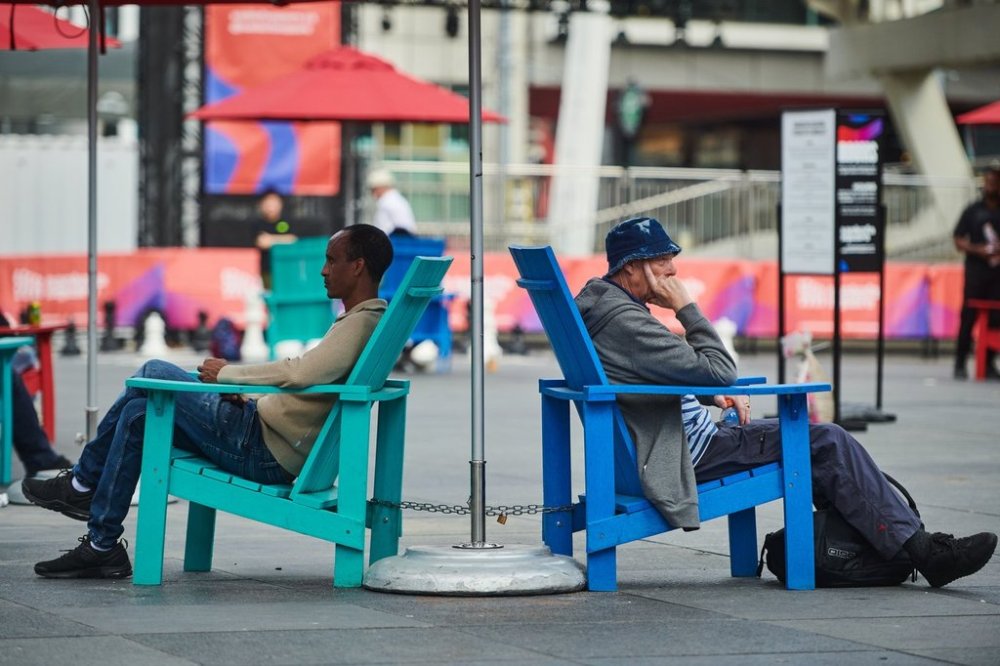Science
Embracing Micro-Relationships: Why Talking to Strangers Matters

Vancouver’s growing emphasis on social connectivity has sparked a movement encouraging interactions with strangers. Psychology professor Gillian Sandstrom from the University of Sussex reflects on her personal journey that began during her graduate studies in Toronto. In 2007, she formed a “micro-relationship” with a woman who ran a hotdog stand near her university. These brief exchanges, though seemingly trivial, significantly impacted Sandstrom’s sense of belonging and inspired her research on the importance of social interactions.
Sandstrom emphasizes that small interactions can weave individuals into the fabric of their communities. Her experience highlights the profound effect of even the most minor social exchanges. She stated, “It really meant something much bigger than it seemed like it should,” underscoring how such connections can alleviate feelings of isolation.
Organizations like GenWell are championing this cause, aiming to foster a culture of engagement among Canadians. Their upcoming initiative, Talk to a Stranger Week, scheduled for November 24-30, 2025, seeks to motivate individuals to engage in conversations with unfamiliar faces. Pete Bombaci, CEO of GenWell, explained that the goal is to provide people with “an excuse” to connect, ultimately enhancing their well-being and fostering a healthier society.
Research conducted by GenWell involving approximately 2,500 respondents revealed a clear link between happiness and social interaction. Participants who greeted strangers or neighbors at least weekly reported higher levels of joy, with an even stronger correlation for those who did so daily. This suggests that these small exchanges contribute significantly to overall mental health.
Individuals like Tony Esteves have personally experienced transformative changes through engaging with strangers. After battling depression in 2016, Esteves challenged himself to speak with at least one new person each day. This endeavor not only helped him overcome his struggles but also enriched his life with meaningful connections, including friendships and even an eight-year romantic relationship stemming from a chance encounter.
The importance of such connections is echoed by Ian Culbert, executive director of the Canadian Public Health Association. He noted that loneliness is a pressing issue, with data from Statistics Canada indicating that over 13 percent of Canadians often feel lonely. Culbert emphasized that fostering social ties can enhance mood and resilience, reducing feelings of isolation.
Research from 2014 published in the National Library of Medicine supports these claims, indicating that social interactions, such as attending community events, can provide protective health benefits. Culbert argues that societal perceptions around interacting with strangers have shifted negatively, often due to fear-based narratives prevalent in political discourse.
Further studies suggest that the so-called “liking gap” may hinder people from engaging with others. Sandstrom’s research indicates that while individuals often believe strangers will reject them, the reality is quite the opposite; people generally find the conversations enjoyable. She noted that this gap stems from a common assumption that others do not share the same interest in connection, which can lead to missed opportunities for meaningful interactions.
As technology reshapes communication, some individuals, like Julia Jacobs, observe a generational divide in social behavior. Jacobs’ son finds it unusual that she enjoys speaking with strangers, attributing it to the prevalence of digital communication over face-to-face interactions.
To combat this trend, initiatives like Talk to a Stranger Week aim to break down barriers and encourage micro-connections. Bombaci believes that fostering these small acts of courage can lead to significant improvements in overall social health. He encourages individuals to embrace “moments of micro-bravery,” such as making eye contact or initiating conversations, which can pave the way for deeper connections and transformative experiences.
In Vancouver, the initiative finds a receptive audience. Some residents, like self-proclaimed extrovert Mack Yong, actively seek out social interactions, viewing them as enriching rather than daunting. Yong expresses that curiosity about others enhances his experiences, especially while traveling.
As the campaign gains momentum, it seeks to remind individuals of the value of community connections. Sandstrom concludes that reaching out to strangers offers mutual benefits, stating, “You’re going to help them feel connected.” Through these small but significant interactions, individuals can combat loneliness and foster a more connected society.
-

 Lifestyle2 weeks ago
Lifestyle2 weeks agoWinnipeg Celebrates Culinary Creativity During Le Burger Week 2025
-

 Science1 month ago
Science1 month agoMicrosoft Confirms U.S. Law Overrules Canadian Data Sovereignty
-

 Education4 weeks ago
Education4 weeks agoRed River College Launches New Programs to Address Industry Needs
-

 Technology4 weeks ago
Technology4 weeks agoDragon Ball: Sparking! Zero Launching on Switch and Switch 2 This November
-

 Science1 month ago
Science1 month agoTech Innovator Amandipp Singh Transforms Hiring for Disabled
-

 Technology1 month ago
Technology1 month agoGoogle Pixel 10 Pro Fold Specs Unveiled Ahead of Launch
-

 Science4 weeks ago
Science4 weeks agoChina’s Wukong Spacesuit Sets New Standard for AI in Space
-

 Technology1 month ago
Technology1 month agoWorld of Warcraft Players Buzz Over 19-Quest Bee Challenge
-

 Health1 month ago
Health1 month agoMontreal’s Groupe Marcelle Leads Canadian Cosmetic Industry Growth
-

 Science1 month ago
Science1 month agoXi Labs Innovates with New AI Operating System Set for 2025 Launch
-

 Business3 weeks ago
Business3 weeks agoDawson City Residents Rally Around Buy Canadian Movement
-

 Technology1 month ago
Technology1 month agoFuture Entertainment Launches DDoD with Gameplay Trailer Showcase
-

 Technology1 month ago
Technology1 month agoGlobal Launch of Ragnarok M: Classic Set for September 3, 2025
-

 Business1 month ago
Business1 month agoNew Estimates Reveal ChatGPT-5 Energy Use Could Soar
-

 Technology1 month ago
Technology1 month agoNew IDR01 Smart Ring Offers Advanced Sports Tracking for $169
-

 Technology1 month ago
Technology1 month agoHumanoid Robots Compete in Hilarious Debut Games in Beijing
-

 Technology1 month ago
Technology1 month agoInnovative 140W GaN Travel Adapter Combines Power and Convenience
-

 Science1 month ago
Science1 month agoNew Precision Approach to Treating Depression Tailors Care to Patients
-

 Health1 month ago
Health1 month agoGiant Boba and Unique Treats Take Center Stage at Ottawa’s Newest Bubble Tea Shop
-

 Technology1 month ago
Technology1 month agoQuoted Tech Launches Back-to-School Discounts on PCs
-

 Technology1 month ago
Technology1 month agoDiscover the Relaxing Charm of Tiny Bookshop: A Cozy Gaming Escape
-

 Education4 weeks ago
Education4 weeks agoAlberta Teachers’ Strike: Potential Impacts on Students and Families
-

 Technology4 weeks ago
Technology4 weeks agoArsanesia Unveils Smith’s Chronicles with Steam Page and Trailer
-

 Technology4 weeks ago
Technology4 weeks agoRaspberry Pi Unveils $40 Touchscreen for Innovative Projects










